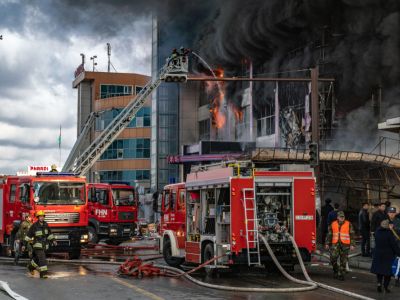The attacks Tuesday on New York and Washington are certain to hurt the already sluggish US economy and stock markets in coming days, warned economy experts Wednesday.
But they said that “the outlook over the long term is less clear,” reported the CNN Financial Network (CNNfn).
"This terrible tragedy is certain to severely dampen consumer confidence and hence have the possibility of shutting down the consumer," said Anthony Chan, chief economist with Banc One Investment Advisors.
"The extent of this negative impact will depend on whether the federal government is able to resolve who is responsible and whether US officials can find the individuals responsible for these actions -- and whether we can add some certainty that this will not happen again."
Two airplanes crashed into the World Trade Center Tuesday morning -- causing both towers, the tallest buildings in the city, to collapse. A plane crash also destroyed a part of the Pentagon outside Washington.
There were no estimates of casualties Tuesday afternoon, but it's almost certain that thousands of people were hurt or killed in the attacks, the worst acts of terrorism in US history.
The network said that the New York Stock Exchange, the American Stock Exchange and the Nasdaq Stock Market did not open Tuesday and said that after consulting with the Securities and Exchange Commission, would remain closed Wednesday.
The exchanges added that, after further consultation with the SEC, they will announce Wednesday when U.S. stock markets would reopen.
Asian markets turned sharply negative at the open.
The economy has been in a year-long slowdown but thus far has avoided a recession, commonly defined as two consecutive quarters of decline in the gross domestic product, the total output of goods and services in the United States, CNNfn added.
"This may be what throws us into recession," Maureen Allyn, chief economist with Zurich Scudder Investments told the network.
The Federal Reserve has cut interest rates seven times this year in a bid to keep consumers spending and avoid a downturn, and the central bank said Tuesday it was ready to provide funds to the nation's banks after the attacks.
Meanwhile, the network said that the terrorist attack on Wall Street and Washington has unnerved investors already enduring the first bear market in a decade.
But the duration of any market sell-off is clouded with questions over how the destruction will affect the fragile economy and psychology.
US markets never opened Tuesday, but those overseas went into freefall, with European stocks tumbling and oil prices surging. The dollar fell as money flooded into gold and Treasury bonds, traditional havens amid uncertainty.
"The immediate economic implications are not good," said Marc Chandler, chief currency strategist at HSBC, who said the attack makes it more likely that the US Federal Reserve will cut interest rates before its regular meeting next month.
Insurance companies may face pressure amid possible billions of dollars of property and life claims. The services sector could run into difficulty, depending on how much travel and shipping are disrupted. And it remains to be seen how airlines, defense companies and oil producers could be affected, it said.
"This is a major, major act of war and act of terrorism that will have widespread economic consequences," said Jeremy Siegel, professor of finance at the Wharton School of Business, who called the immediate market panic unsurprising given the event.
The attack comes at a fragile time for the economy, which posted almost no growth last spring despite a series of interest rate cuts by the Federal Reserve – Albawaba.com
© 2001 Al Bawaba (www.albawaba.com)









